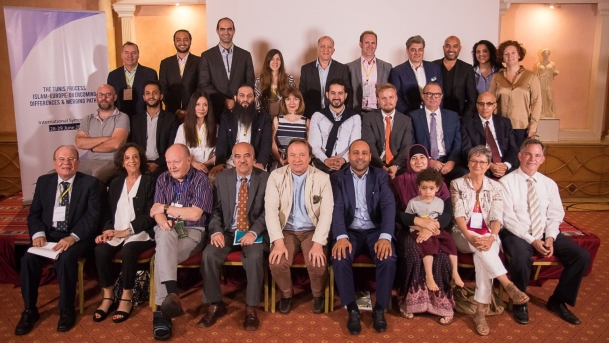
Aljazeera Center for Studies (AJCS) and the Berlin-Based Dialogue of Civilizations Research Institute (DOC), in partnership with the LBH Foundation, are holding the second international symposium “Reshaping Civilizational Dialogue: Bridging Discourses” of the Tunis Process in Rhodes, Greece 13 October 2019. The objective of the new conference is to help create a meaningful dialogue on the following issues and to develop initiatives that will address: 1) acknowledging the grievances of the past, fear of one another, and perceived threats; 2) deconstructing stereotypes; 3) mitigating frustrations; 4) determining what needs to be done to rebuild and build trust; and 5) how to create new solidarities and forge a common vision.
Panelists from several Arab and European countries will focus on three angles, which are informed by perspectives from the European, Arab, Russian, and Central Asian experiences:
-
What we want to achieve (ex: altering dominant discourses, building trust, inventing new solidarities, etc.)
-
Who will implement initiatives that address the above issues (ex. grassroots organisations, local government, international institutions, the corporate sector, influencers?)
-
How can sound policies, education, knowledge production and sharing, youth exchanges, etc. be implemented? And how can initiatives create a conducive environment for healing and building shared paths?
The Rhodes symposium is the second of a three-event series of conferences and focus groups of the Tunis Process, with the aim of opening up a space for co-creation, in order to identify differences to overcome and find possible paths to be shared between Muslims and non-Muslims. The process is inspired by the will to act and to find solutions rather than establish or reinforce dogmas, covering various perspectives of the Muslim and the Western worlds in a multidisciplinary manner, with a spirit of openness and the willingness to understand one another. It is a completely independent initiative that does not comply with the injunctions or the agendas of any organisation’s specific interests.
The first symposium “Islam and Europe: Overcoming Differences, Sharing Paths” was organized in Tunis, 28-29 June 2019. A total of 39 participants took part in the two-day closed event, coming from countries including Tunisia, Algeria, Morocco, Qatar, Jordan France, Germany, the United Kingdom, and the United States. In order to cover a wide range of perspectives, participants from a variety of backgrounds were invited – former government officials, civil society representatives, academics, media, and influencers gathered for the inaugural event of the Tunis Process, contributing to the public debate on the relationship between Islam and Europe.
The outcomes from the symposium in Tunis led the organisers to develop the Rhodes event based on the idea the after acknowledging the ‘wounds of the past’ (colonialism, etc.), we must move forward in bridging discourses and developing initiatives that help us to move away from long-held prejudices, fears, and misconceptions. Many dominant narratives in both Muslim-majority countries and in Europe are widening the gap between communities, and continue to hinder the co-creation of a common future. Dismantling misperceptions exacerbated by xenophobia, ideological extremism, and exclusion of the ‘other’ and creating inclusive paths need be at the core of initiatives, from the grassroots level to international policy. Only then can concrete initiatives that will have meaningful and lasting impacts be developed.
The symposium in Tunis showed how religious and ideological tensions and the need to forge common paths between Muslims and non-Muslims are not limited to Europe and Arab Muslim countries. The dynamics between Russia and Central Asia show many similarities between Europe and North Africa and the Levant for instance. For this reason, panelists will also address the topic from the Russian and Central Asian perspectives. Europe and Russia are often seen as two separate ‘poles’ in the world order, however they both are dealing with the challenges of integrating Muslim populations and reconciling relations with their Muslim neighbours to the south. This double perspective on Muslim and non-Muslim relations is what makes the Tunis Process symposium at Rhodes unique and will offer creative solutions that are more widely applicable.
The importance of active grassroots civil society organisations is imperative in all regions when it comes to interfaith dialogue because of their direct engagement with stakeholder populations. While government policies can contribute to change, oftentimes it is at the micro level where the strongest impact can occur. The involvement of youth in this project is also critical, as their willingness and desire to reconcile differences and move forward can be stronger than with older generations.
 |
| Some of the participants at the Tunis Conference (June 28-29, 2019) [Al Jazeera] |